[image-caption title="Illustration%20by%20Jerry%20Mosemak%2FNRECA" description="%20" image="%2Fremagazine%2Farticles%2FPublishingImages%2Froadwarriors-lead.jpg" /]
[section separator="true"]
[section-item 3]
[row]
[column 12]
The next time you’re at a hotel and you notice someone alone in the exercise room running on a treadmill late at night, think of Mark Schneider.
[/column]
[/row]
[/section-item]
[section-item 9]
[row]
[column 12]

[/column]
[/row]
[/section-item]
[/section]
“I’m that guy,” says Schneider, a vice president at the
National Rural Utilities Cooperative Finance Corp. (CFC), who last year was on the road 43 of 52 weeks. “I’m the person who didn’t have a choice when to exercise but did it when they could.”
As one of the hundreds of “road warriors” in the electric cooperative program, Schneider logs thousands of miles behind the wheel or on flights to visit member co-ops, make presentations, answer questions and get the critical face-to-face time that builds relationships and helps co-ops and the associations that support them flourish.
“You have to have those informal moments, when you’re sipping on your coffee, asking about their lives,” Schneider says. “Every week, you meet people who just blow you away, amazing people who are stepping into leadership roles in their communities.”
To stay on top of their personal and professional lives, co-op road warriors become masters of discipline and logistics. And while schedules are usually set weeks or months in advance, they also learn to take in stride the inevitable setbacks like canceled flights, car troubles or bad internet. They capitalize on unexpected windows of free time to catch up on phone calls, check in with family and friends or even do some sightseeing.
[blockquote right quote="%E2%80%9CI%20can%20pack%20for%20a%20three-day%20trip%20in%20five%20minutes.%E2%80%9D" author="Rusty%20Endicott%2C%20Safety%20and%20Loss%20Prevention%20Manager%2C%20Federated%20Rural%20Electric%20Insurance%20Exchange" color="neutral-primary-alt" /]
A life of work travel is unquestionably grueling. But America’s hardy electric co-op road warriors say they can’t imagine a more rewarding career, where they can witness the positive differences they make and cherish the lifelong relationships they form.
“I just don’t know what else I would do,” says Erik Hayes, who travels at least 80% of the year as an NRECA senior field representative in the West. “Jobwise and life-wise, it’s just so satisfying to meet these folks and help them out.”
What follows is a glimpse into the daily lives of 10 of the co-op program's road warriors.
[section]
[section-item]
[row]
[column 12]
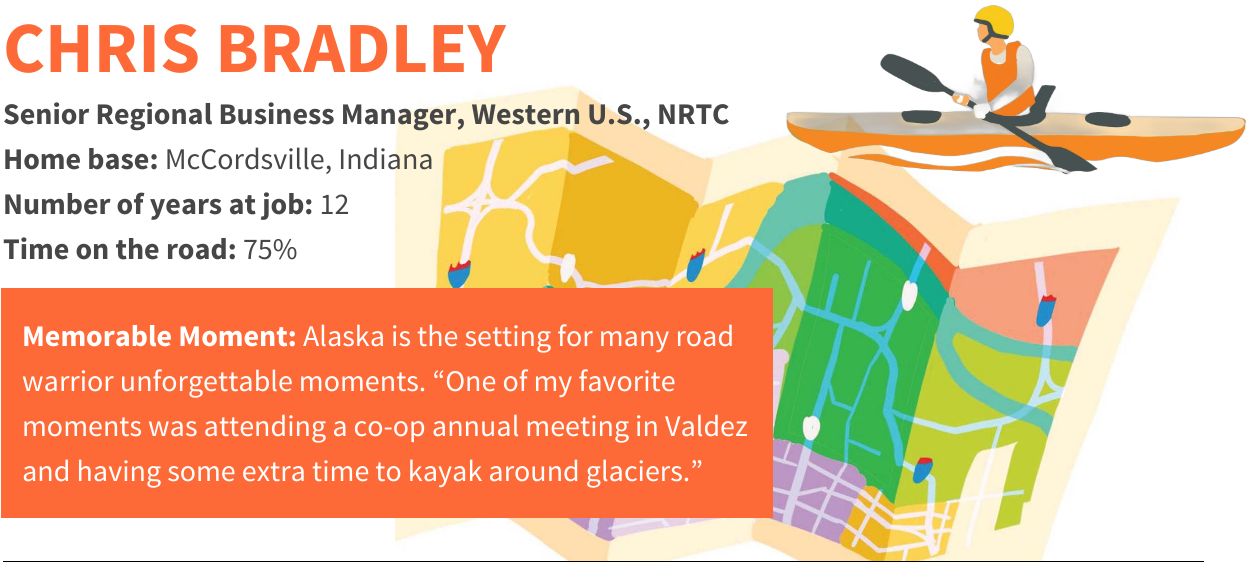
[/column]
[/row]
[/section-item]
[/section]
“I’ve been building trust for 12 years,” says Chris Bradley. “I feel like co-ops want to see people in person instead of on a screen.” Virtual meetings have their place, but “it’s tough to see body language, expressions and emotions over the computer. It’s much easier in person.”
Promoted to his current position at NRTC in January, Bradley’s responsibilities include helping co-ops assess how technology advancements can address grid challenges and other concerns and updating them on NRTC products and services.
[section separator="true"]
[section-item 8]
[row]
[column 11]
Bradley has learned to maximize each co-op visit.
“You go there to discuss a certain technology and then that translates into needing to address their overall technology plan,” he says. “When you’re on site, you’re going to pass by the finance manager’s office or the engineer’s office. You’re interacting with them or sharing a laugh … just like a watercooler conversation. You pick up new things every time you’re there."
Bradley is a master of logistics who lines up multiple visits while allowing adequate time to drive the often hundreds of miles between co-ops. It’s not uncommon to rack up 1,000 miles a week. “In Indiana or Ohio, you can drive four hours and visit several co-ops. In the West, it’s four co-ops in a week.”
[/column]
[/row]
[/section-item]
[section-item 4]
[row]
[column 12]
[image-caption title="Chris%20Bradley%20(left)%20with%20Kit%20Carson%20EC%20CEO%20Luis%20Reyes.%20(Photo%20Courtesy%3A%20Chris%20Bradley)" description="%20" image="%2Fremagazine%2Farticles%2FPublishingImages%2FRoad%20warriors%20Bradley-14.jpg" /]
[/column]
[/row]
[/section-item]
[/section]
Long distances also mean fewer rest stops—and bathrooms and gas stations. “Bathroom breaks are easy when there are exits every mile. That’s just not the case in the West,” he says.
In the end though, the extra miles build trust and goodwill on both sides. Co-ops appreciate the extra effort it takes to see them.
“It’s easier to get those appointments when they know you and they’ve been around you for so long.”
[image-caption title="A%20photo%20from%20Chris%20Bradley's%20travels%20to%20Alaska.%20(Photo%20Courtesy%3A%20Chris%20Bradley)" description="%20" image="%2Fremagazine%2Farticles%2FPublishingImages%2Fbradley-alaska.jpg" /]
[section]
[section-item]
[row]
[column 12]
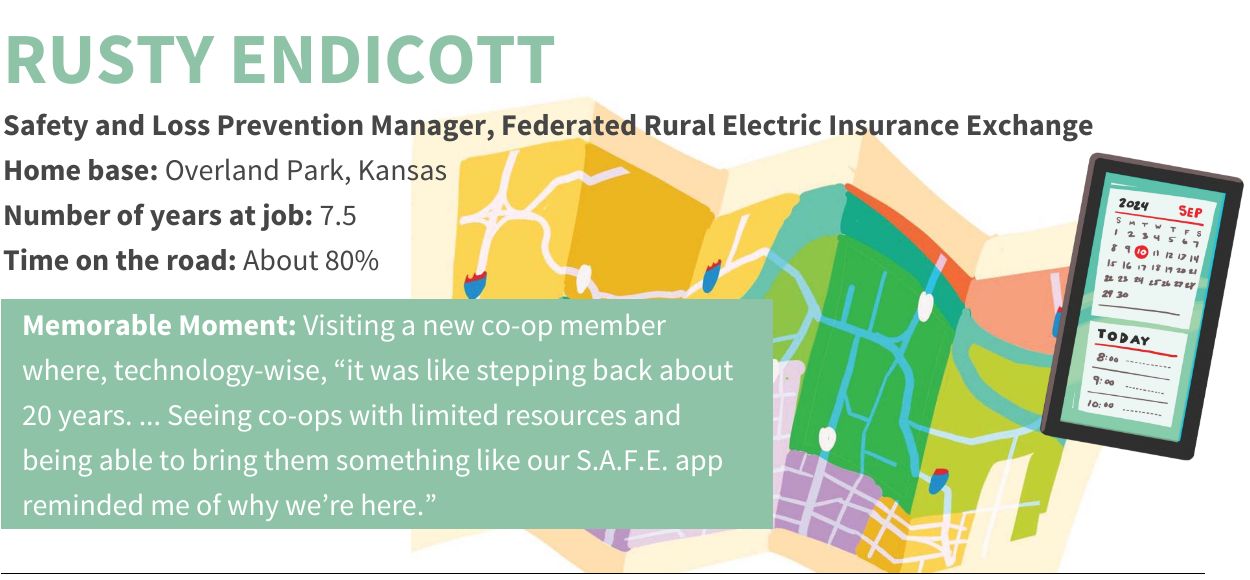
[/column]
[/row]
[/section-item]
[/section]
Rusty Endicott calls his staff of 20 at Federated the “real road warriors,” but it’s hard to imagine anyone who travels as much as he does.
[section separator="true"]
[section-item]
[row separator="default"]
[column 6]
By the 51-year-old’s reckoning, he’s on the road 41 of 52 weeks a year. On top of his co-op check-ins, Federated encourages Endicott to serve as an instructor in NRECA’s Certified Loss Control Professional Program, and he was recently named to the commission that governs the program.
Endicott credits “late nights, long hours and being intentional” for letting him make it to his two sons’ athletic events when they were high schoolers, despite his heavy travel schedule.“I didn’t make practices, but I didn’t miss a meet,” he says.
“I tell my employees, ‘If you miss something, it’s your own fault, because you didn’t schedule appropriately.’”
[/column]
[column 6]
[image-caption title="Rusty%20Endicott%20in%20the%20field.%20(Photo%20Courtesy%3A%20Rusty%20Endicott)" description="%20" image="%2Fremagazine%2Farticles%2FPublishingImages%2FRoad%20Warrior-Endicott-4.jpg" /]
[/column]
[/row]
[/section-item]
[/section]
When he’s not training or supporting his staff, Endicott is evaluating individual co-ops’ safety programs and procedures, speaking at conferences or working with statewide co-op associations on joint initiatives like Commitment to Zero Contacts.
Face time is the best way to broach sobering topics such as prevention of electrical contacts, he says, “because it’s hard to get the sincerity or passion across if you’re not in person. Showing up means you care. It’s something we have to talk about.”
Endicott has traveled to 47 of 50 states for Federated. (“I can pack for a three-day trip in five minutes.”) And when the days seem to blend together, he gives himself the same advice he offers members: Slow down.
“Be where your feet are, and stop and focus,” he says. “I’ll be visiting a co-op in a mind-blowingly beautiful area and realize that I get paid well to do this and I’m making a difference.”
[section]
[section-item]
[row]
[column 12]
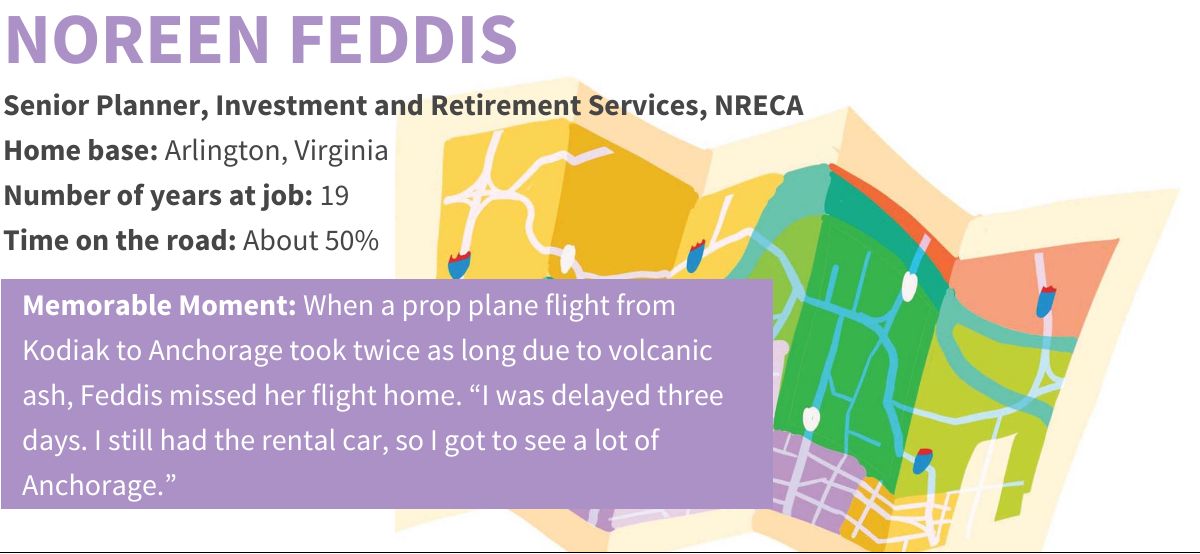
[/column]
[/row]
[/section-item]
[/section]
If you’ve ever called NRECA’s Personal Investment & Retirement Consulting (PIRC) member service line, you might have chatted with Noreen Feddis. As one of 12 PIRC planners, she fields calls from NRECA retirement plan participants two weeks a month and travels the other two.
“All of us pretty much used to work as broker dealers in the financial industry, but now we work on the fun side,” Feddis says. “We’re not working on commission. We’re educating people, making sure they understand their benefits through the 401(k) Pension Plan and Retirement Security Plan.”
Regular opportunities to experience co-op hospitality are big job perks. “They’re the nicest people. They’re not confrontational. They’re not like, ‘The market went down. What does this mean?’ They want to know whether their investments are allocated appropriately, and they’re just so receptive. I get hugs at the end of retirement planning seminars.”
[section separator="true"]
[section-item 4]
[row]
[column 11]
As a longtime road warrior, Feddis has lived through technological sea changes. Flip phones came on the scene during the late 1990s and early 2000s. And before GPS, MapQuest and Google Maps, bulky Rand McNally atlases helped guide her around the country.
[/column]
[/row]
[/section-item]
[section-item 8]
[row]
[column 12]
[image-caption title="Noreen%20Feddis%20(left%20in%20left%20photo)%20on%20the%20road%20with%20colleague%20Kristina%20Reitzel.%20And%20before%20the%20days%20of%20thumb%20drives%2C%20advisers%20shipped%20out%20projectors%20in%20a%20big%20metal%20box%20(right%20photo).%20(Photos%20Courtesy%3A%20Noreen%20Feddis)" description="%20" image="%2Fremagazine%2Farticles%2FPublishingImages%2Ffeddis.jpg" /]
[/column]
[/row]
[/section-item]
[/section]
“You can buy them at the 7-11. We all had them. They had all 50 states and with the bigger cities, you’d get local maps. Some states had many pages, some just one. And then we got MapQuest. So before we left, we always printed out our maps.”
Before the days of thumb drives, advisers also had to ship out projectors if they were to present financial seminars. “We would mail them in a big metal box and then we’d have to send them back. We printed a lot of things and shipped a lot of things.”
[section]
[section-item]
[row]
[column 12]
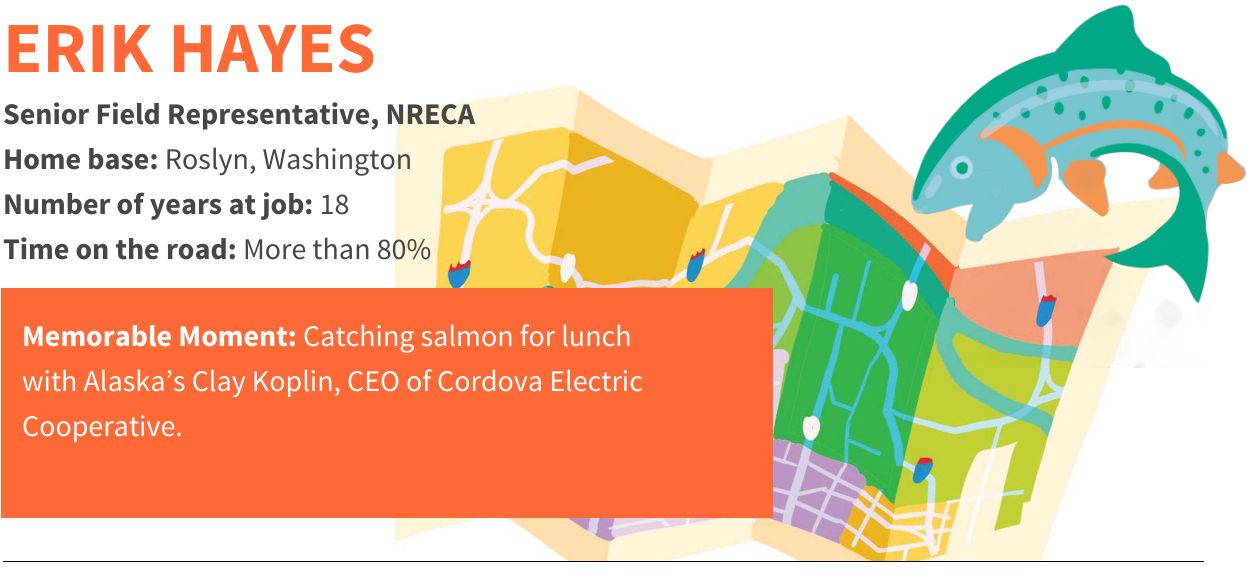
[/column]
[/row]
[/section-item]
[/section]
Before joining NRECA in 2007 as a planner on the Personal Investment & Retirement Consulting (PIRC) team, Erik Hayes was a stockbroker, flight instructor and a pilot of small cargo planes. His field representative job has required the most travel.
“Absolutely, 100%. Honestly, even when I was a pilot, I was home at night for the most part.”
[section separator="true"]
[section-item 8]
[row]
[column 11]
But that suits Hayes’ personality just fine.
“My dad was in the Air Force, and we used to move a lot. So being in one place sometimes doesn’t feel comfortable anyway. I guess I’m just kind of a natural traveler and mover. A normal homebody person probably wouldn’t like this job.”
Hayes says he needs regular face time with the 60 co-ops in his five-state rotation, including Alaska and Hawaii, to serve members well.
“I can do my job behind a screen, but the genuine connection of shaking someone’s hand or meeting their spouse and seeing where they live … it wouldn’t be the same. You wouldn’t go out with them after the benefit seminars and meetings and really be immersed in where our members live, what they do and what they’re dealing with.”
[/column]
[/row]
[/section-item]
[section-item 4]
[row]
[column 12]
[image-caption title="Erik%20Hayes%20with%20his%20girlfriend%2C%20Ashley.%20(Photo%20Courtesy%3A%20Erik%20Hayes)" description="%20" image="%2Fremagazine%2Farticles%2FPublishingImages%2FRoad%20warriors%20Hayes.jpg" /]
[/column]
[/row]
[/section-item]
[/section]
The personal connections Hayes has forged over the years has helped him build trust with members and fit in with co-ops’ informal vibe.
“I can’t remember the last time I wore a suit and a tie at a co-op. I usually go business casual…jeans, boots and a button-down shirt. If I showed up in a suit and tie, they’d be like ‘What are you trying to sell me?’
“It’s so satisfying to meet these folks and help them out. I’ve made lifelong friends and so even when this job is done, they’ll still be around.”
[section]
[section-item]
[row]
[column 12]
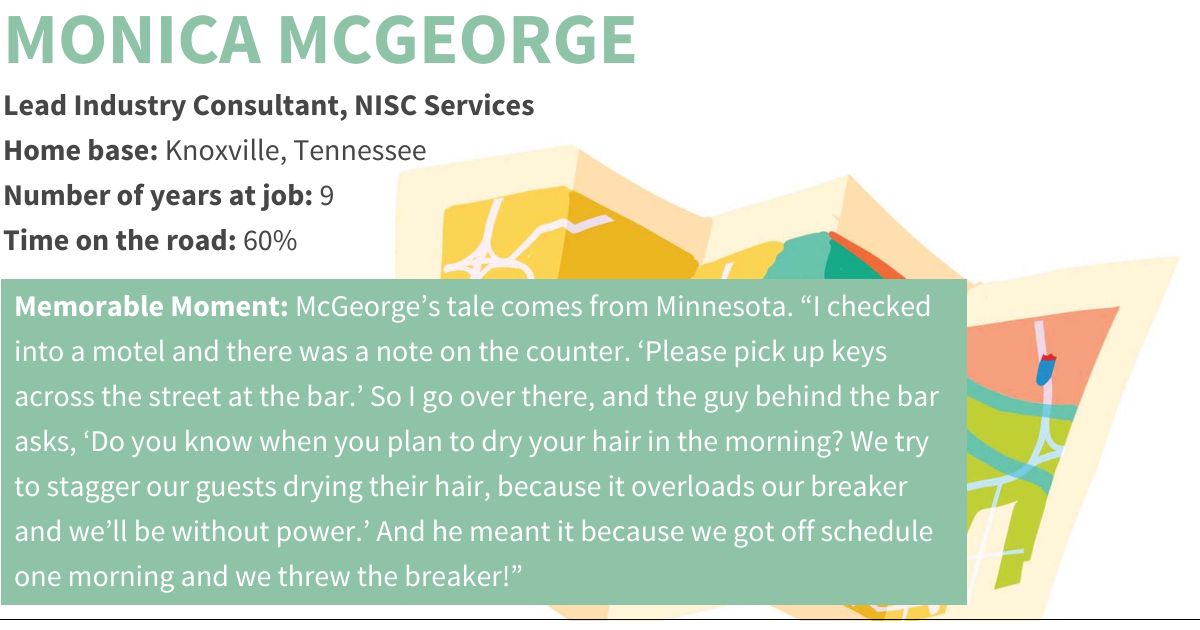
[/column]
[/row]
[/section-item]
[/section]
Monica McGeorge helps NISC stay abreast of the latest developments in the larger industry and among members to help drive its overall strategy. And while NISC plies its trade in technological advancement, it also relies on old-fashioned personal visits to gauge co-ops' needs: member engagement (including outage notification and self-serve options); human resources (balancing work schedules amid hybrid work environments); and distributed energy management resource systems, rates and energy conservation.
[section separator="true"]
[section-item 6]
[row]
[column 12]
“If we're in someone's office, it's a way for us to get feedback that they might not have wanted to put in writing or share during a recorded virtual meeting," says McGeorge, a former compliance analyst at TVA. “There's something to be said for face-to-face investment. I think of them as handwritten notes. A card in the mail with a signature is a little more meaningful."
McGeorge can easily spot who isn't a road warrior. During the mass CrowdStrike IT outage in July, it took her four days to get from Buffalo, New York, to her home in Knoxville, Tennessee. During the Atlanta leg of her odyssey, when she finally got back inside the airport after a three-hour wait on the tarmac, “it was midnight and there was a sea of people and luggage had already started piling up. People were on their phone apps, trying to get a hotel. I thought, 'Nope. Apps can't keep up. This is the time you've gotta call the hotel.' If you're not a travel warrior, I guess you would've just stood there and waited in line."
[/column]
[/row]
[/section-item]
[section-item 6]
[row]
[column 12]
[image-caption title="Monica%20McGeorge%20with%20a%20map%20of%20the%20U.S.%20states%20she%E2%80%99s%20visited.%20(Photo%20Courtesy%3A%20Monica%20McGeorge)" description="%20" image="%2Fremagazine%2Farticles%2FPublishingImages%2FRoad%20warriors%20McGregor-13.jpg" /]
[/column]
[/row]
[/section-item]
[/section]
Eventually, McGeorge got a ride home from her daughter, who drove three and a half hours from Knoxville to Atlanta. “You learn to pivot quickly as a road warrior. You do it so long and you're like, 'Well, that's about to happen. I'm shifting here.'"
[section]
[section-item]
[row]
[column 12]
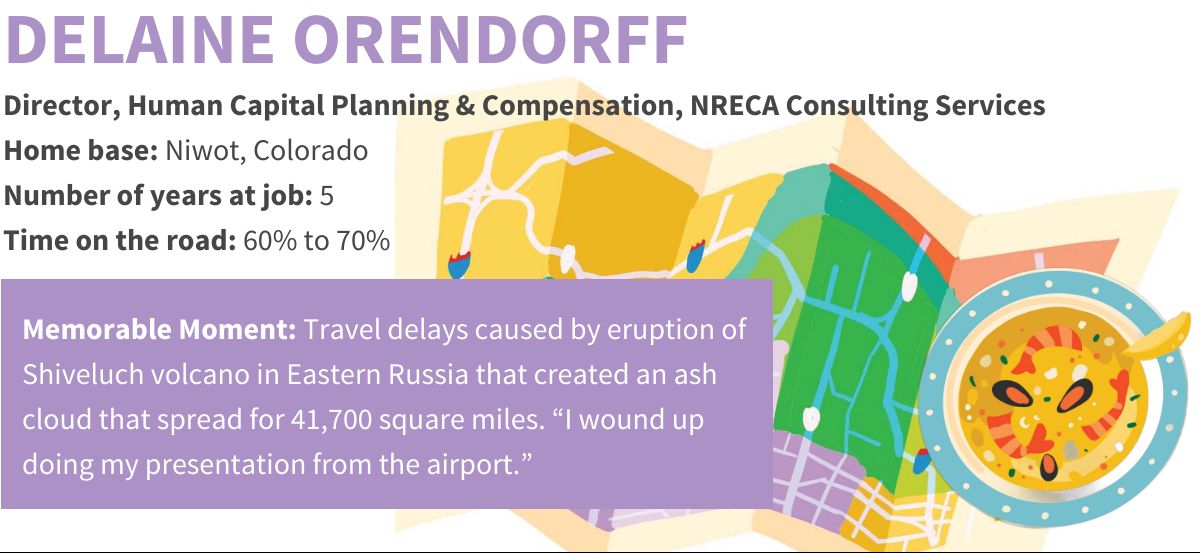
[/column]
[/row]
[/section-item]
[/section]
Like most co-op road warriors, Delaine Orendorff never traveled as much as she does in her current role. And like most, she does her best work in person.
“I facilitate a lot of meetings, and body language is so much of how we communicate, so in order to provide the best service for our members, it has to be done in person.”
Attracting, hiring and keeping top talent are hot topics at co-ops these days in Orendorff’s work for NRECA Consulting Services, formerly National Consulting Group.
[section separator="true"]
[section-item 8]
[row]
[column 12]
“The crux of all my work really focuses on retention, and co-ops are asking, ‘How can we create a better environment? How can we make sure we pay people appropriately? How can we grow and develop our folks?’”
A typical day for Orendorff goes like this: “You’re up at 5 a.m., and you’re on the 9 a.m. flight. You fly two hours, and then you drive two hours, and all the while you’re changing time zones. By the time you hit your hotel at 5 p.m., you’re tired. Or, you’ll go right to the co-op for a 3 p.m. meeting.” Somewhere in between, she squeezes in meals, sometimes foraging at rest stop vending machines or truck stops for healthy food options. “Our co-ops are really good at welcoming you and providing great meals. It’s really, really hard to resist that kind of hospitality.”
[/column]
[/row]
[/section-item]
[section-item 4]
[row]
[column 12]
[image-caption title="NRECA%E2%80%99s%20Delaine%20Orendorff%20with%20Kira%2C%20her%20pet%20Samoyed.%20(Photo%20Courtesy%3A%20Delaine%20Orendorff)" description="%20" image="%2Fremagazine%2Farticles%2FPublishingImages%2FRoad%20warriors%20Orendorff-1.jpg" /]
[/column]
[/row]
[/section-item]
[/section]
“I feel very purpose-driven,” Orendorff says. “When we make a difference, whether it’s culture, compensation or succession planning…anytime I hear that the co-op’s work environment is improving or I’m helping them retain or attract talent. They don’t always have a lot of internal resources, and they’re looking to us for solutions.”
[section]
[section-item]
[row]
[column 12]
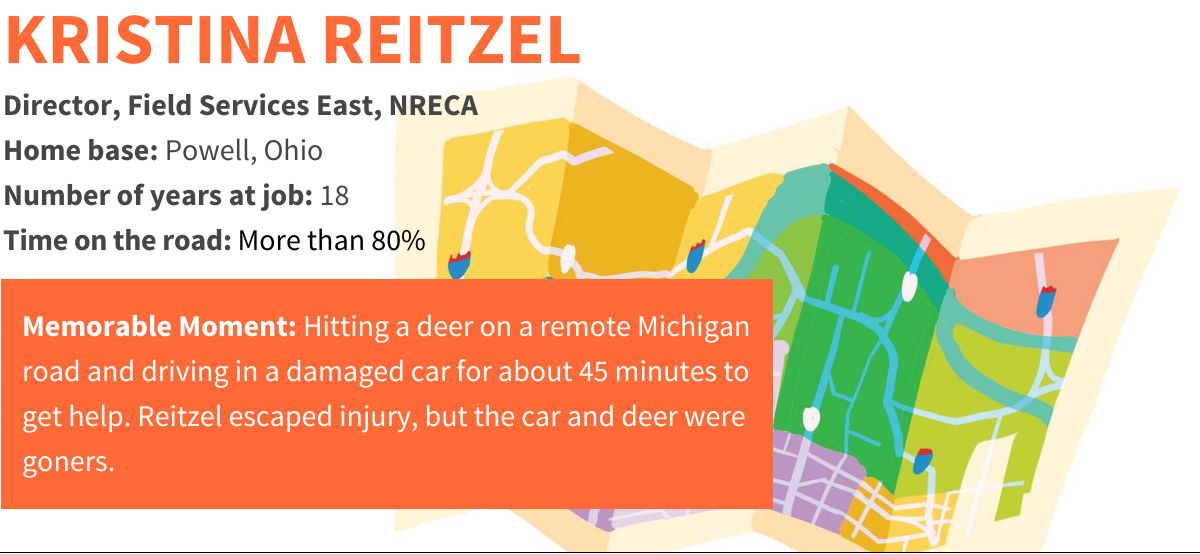
[/column]
[/row]
[/section-item]
[/section]
At the time of her interview, Kristina Reitzel was shouldering an unusually heavy travel load because she was training her successor and stepping into her new director position. With over 80 co-ops in the three states she covers, “I’m usually visiting co-ops a minimum of three days a week, but during annual enrollment time, it’s every day.”
When Reitzel was a field representative, she spent more time behind the wheel. But because directors fly more, “there’s another whole layer of challenges because you’re dealing with delays and flight cancellations. I was in Asheville (North Carolina) for a G&T conference and arrived at the airport at a reasonable hour and a half before my flight. The system went down, and I was waiting in line for four hours. The lines were so backed up, they were literally wrapped around the entire airport through the baggage claim and out the door.”
Reitzel keeps her personal life on track with a detailed schedule and help from her “superdad” husband, Brian Followell, and extended family.
[section separator="true"]
[section-item 6]
[row]
[column 11]
“I use my weekends very efficiently to spend time with my family and get them organized for the week. Saturdays are for whatever the kids want to do, and I treat dinners out to give my husband a break. I prepare meals for the week on Sundays and have outfits laid out and backpacks ready to make it easier when I’m gone.”
[/column]
[/row]
[/section-item]
[section-item 6]
[row]
[column 12]
[image-caption title="Kristina%20Reitzel%20with%20her%20family%20on%20Mother's%20Day.%20(Photo%20Courtesy%3A%20Kristina%20Reitzel)" description="%20" image="%2Fremagazine%2Farticles%2FPublishingImages%2Froadwarrior-reitzel.jpg" /]
[/column]
[/row]
[/section-item]
[/section]
[section]
[section-item]
[row]
[column 12]
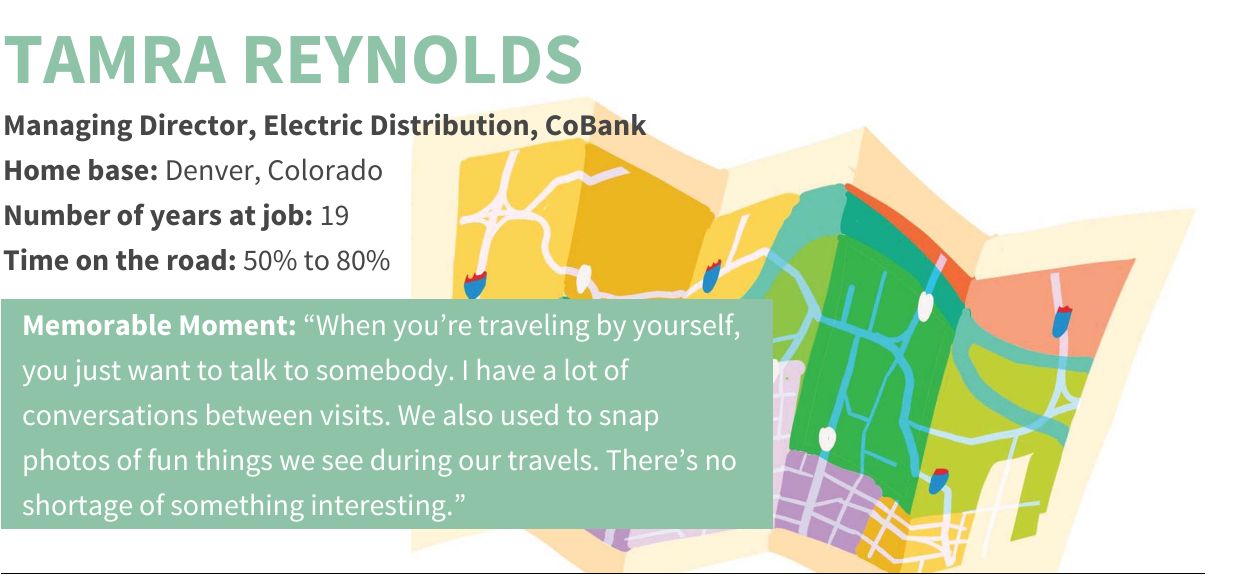
[/column]
[/row]
[/section-item]
[/section]
Tamra Reynolds manages a team of six bankers, or “relationship managers,” primarily in CoBank’s South and Midwest regions. She also develops workshops on electric vehicles, battery storage, renewables and DER and facilitates sessions for co-ops through Beacon Global Strategies.
[section separator="true"]
[section-item 4]
[row]
[column 11]
Most of Reynolds’ CoBank career has been on the road, advising co-ops, agribusiness and Farm Credit customers.
“The strategic advantage that we bring is that we can help our members navigate challenges and that involves building trust and relationships with those co-ops, leadership teams and boards. You need those in-person interactions to develop solid relationships and have what I would call crucial conversations.”
[/column]
[/row]
[/section-item]
[section-item 8]
[row]
[column 12]
[image-caption title="Tamra%20Reynolds%20high-fives%20a%20young%20girl%20during%20an%20NRECA%20International%20trip%20to%20Guatemala.%20(Photo%20Courtesy%3A%20Tamra%20Reynolds)" description="%20" image="%2Fremagazine%2Farticles%2FPublishingImages%2FRoad%20warriors%20Reynolds.jpg" /]
[/column]
[/row]
[/section-item]
[/section]
Reynolds’ best advice for road warriors: “Make space for the personal stuff, the fun stuff, the family stuff, and then try to build around that. COVID, in particular, really forced me to have to balance and set boundaries on when I work, how I work and where I work. It’s easy to work 12 hours a day and not miss a beat. Be intentional about your boundaries. Be thoughtful around your time and where it’s best spent.”
[section]
[section-item]
[row]
[column 12]
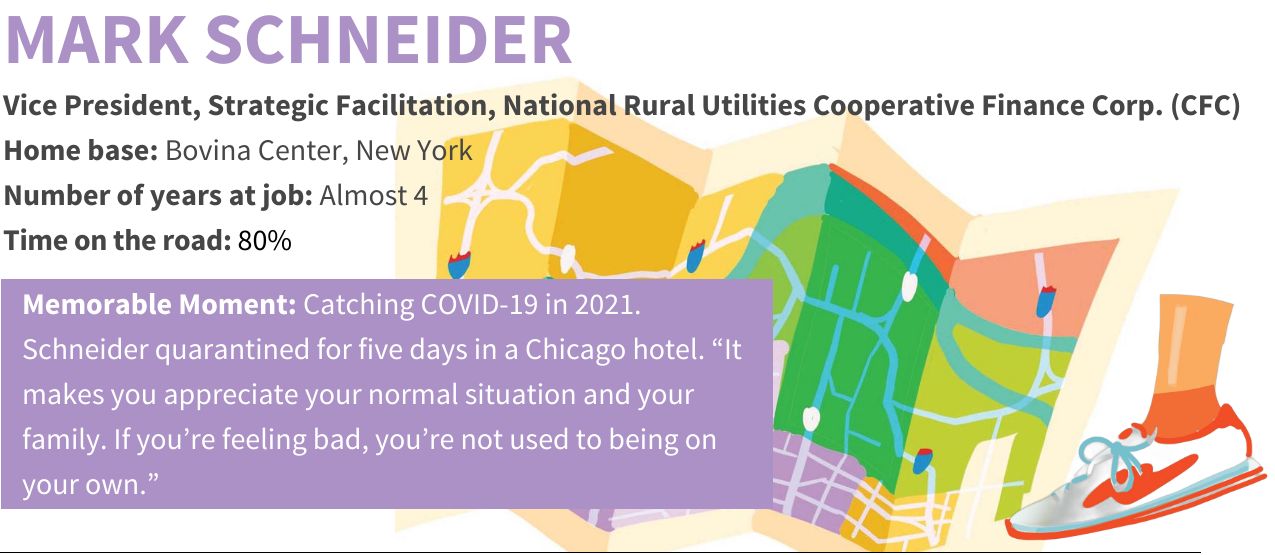
[/column]
[/row]
[/section-item]
[/section]
“As a facilitator, I need to pay attention to nuances like posture and facial expressions and sometimes change the course of the conversation if individuals are feeling uncomfortable. We want every person to know they’re respected and valued in that meeting. But we also can’t afford to let people’s emotions, intentionally or unintentionally, derail the meeting.”
During his 43 weeks of work travel for CFC last year, Schneider stayed on the healthy-living bandwagon in part by trying to stick to a regular sleep schedule (“As tempting as it is, I don’t turn on the TV when I get back to the hotel. I go right to sleep.”) And, of course, exercise; he’s resorted to running laps around a hotel parking lot at 4:30 a.m. To help maintain accountability, Schneider group texts his 24-year-old son and workout buddies.
[section separator="true"]
[section-item 6]
[row]
[column 11]
“I’m usually not in a beautiful countryside but on the edge of a town next to a strip mall. I go to extremes to fit in exercise and healthy eating, and I really try to be consistent.”
Much as he tries to plan ahead, Schneider, a father of three, has missed some of the important moments when you’re needed at home: “The big game, the end-of-year awards ceremony or even when one of your kids gets off the bus crying.”
[/column]
[/row]
[/section-item]
[section-item 6]
[row]
[column 12]
[image-caption title="Mark%20Schneider%20(right)%20being%20strong-armed%20by%20a%20member.%20(Photo%20Courtesy%3A%20Mark%20Schneider)" description="%20" image="%2Fremagazine%2Farticles%2FPublishingImages%2FRoad%20warriors%20Schneider-5.jpg" /]
[/column]
[/row]
[/section-item]
[/section]
However, the former CEO of New York’s Delaware County Electric Cooperative, his hometown co-op, says his family gives him grace and “appreciates the blessings that my job brings into our lives.”
“Those of who are blessed to work with members every week are really lucky. The co-op world is filled with amazing human beings that make my work fun and inspire me to be a better person.”
[section]
[section-item]
[row]
[column 12]
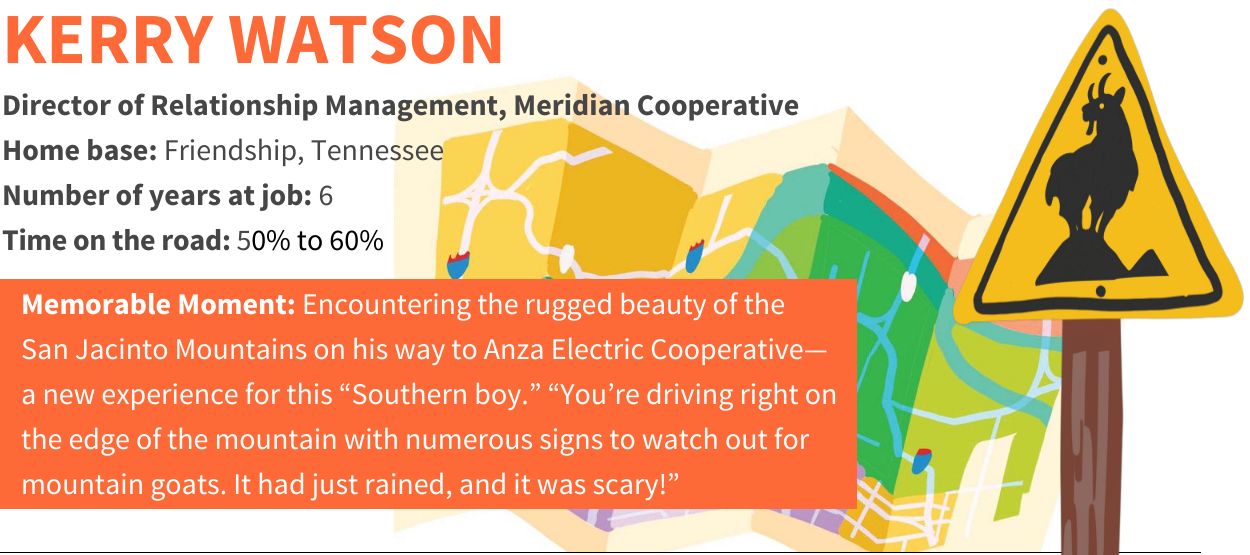
[/column]
[/row]
[/section-item]
[/section]
Kerry Watson's introduction to co-ops involved an airplane ride. As a 1989 participant in the NRECA Electric Cooperative Youth Tour, he traveled to Washington, D.C., as a delegate for hometown co-op Gibson EMC.
“I've come full circle," says Watson, who still lives on Gibson's lines.
Watson worked for Gibson EMC as vice president of member care for 11 years prior to joining the vendor side of the business. Watson is still on the road on behalf of co-ops and municipal utilities for software and technology developer Meridian Cooperative, as a relationship manager for six years and recently as a new director in that department.
In-person visits are crucial, he says, to build trust among members and meet their needs.
“You've got to sit beside them and talk to them," Watson says. “And, you know, honestly, that's when they think about things and that's when they open up to you and tell you what's really going on in the utility and what they need help with or what issues are going on. It's easier to lose focus during virtual meetings."
These days, co-ops are asking about the latest software products, electric vehicles and EV rates and distributed energy resource management systems.
[section separator="true"]
[section-item 4]
[row]
[column 12]
“AI is also huge. Co-ops are asking for balanced information on its functionalities."
Now that he co-manages the department, Watson's travel schedule has shrunk, but not by much. Instead of going around the country, it's now mostly Kentucky and Tennessee. Still, he spends enough time away from home that his 12-year-old son, Kayden, notices.
[/column]
[/row]
[/section-item]
[section-item 8]
[row]
[column 12]
[image-caption title="Kerry%20Watson%20poses%20for%20a%20holiday%20family%20photo%20(left)%20and%20cheers%20on%20his%20Tennessee%20Volunteers%20at%20an%20SEC%20football%20game.%20(Photos%20Courtesy%3A%20Kerry%20Watson)" description="%20" image="%2Fremagazine%2Farticles%2FPublishingImages%2Froadwarriors-watson.jpg" /]
[/column]
[/row]
[/section-item]
[/section]
“With his being a preteen, now's the time a son needs his dad. That pulls on me a little, but it helps that I don't need to be gone lengthy amounts of time."
“The great people" at co-ops and municipal utilities are the best part of Watson's job. “They are truly working to provide a needed service while bettering their local communities. They give back to help their communities thrive and grow."
